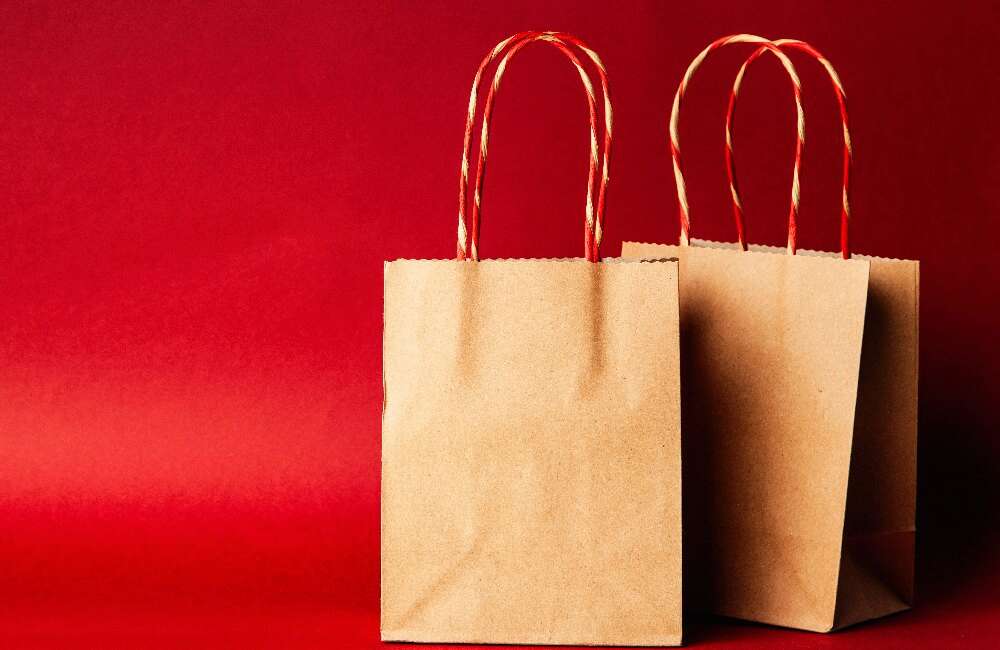Companies manufacture paper bags for businesses worldwide. Paper bags for business can be found in virtually all industries, including restaurants, food and beverage, and retail. The industry is expected to continue to grow at a rate of 4.1% CAGR between 2022 and 2030.
Paper Bag Making Stats
Paper bag production will have a market size of $5.2 billion in 2022. It's estimated that the industry will have a value of $7.3 billion by 2030. The rise in industry value is due to the rise in paper bag usage.
Consumer behavior has transitioned from plastic bags to paper bags in recent years.

A few reasons for the change in usage include:
- Paper is seen as a renewable resource
- Paper breaks down in landfills
- Cities have adopted bans on plastic bags
In the United States, there is no national ban on plastic bag usage. Plastic is seen as a single-use product that is responsible for pollution and overflowing landfills.
A lack of a national ban has led to many states initiating their own bans, including:
- California
- Connecticut
- Delaware
- Hawaii
- Maine
- New Jersey
- New York
- Oregon
- Vermont
- Washington
Colorado has passed a law, which will go into effect in 2024, to ban single-use plastic bags. The law also allows certain impacted industries to charge their customers a $0.10 paper bag fee starting in 2023.
Banning non-reusable bags and single-use bags is the goal of many state laws.
The lack of plastic bags has led to rising demand for paper bag material that is unlikely to slow in the near future.
Facts About Business Paper Bags
Business paper bags are seeing a steady increase in usage for a few reasons:
- On-the-go restaurant usage is rising, leading to a major increase in sales in the restaurant sector
- The United States imports the most paper bags
- France is the second-largest importer of paper bags
- Germany is the third-largest importer of paper bags
- Germany, China, and the United States are the largest exporters of paper bags
- 79% of consumers find that paper bags are more pleasant to touch and handle
- 86% of Europeans will choose paper bags over any other material when its offered
One concern for paper bag manufacturers is that the preference of online shopping may hinder growth. The industry is seeing more consumers prefer shopping online, meaning fewer retailers are purchasing paper bags.
Statistically, online shopping is:
- Preferred by 66% of younger people
- Less than 30% of all retail sales
The rise of Amazon and similar retailers has destabilized many offline stores, but there are still more people making purchases offline than online. In the case of fast and convenient restaurant ordering, outlets like GrubHub and UberEats still deliver many foods in paper bags, so they’re still a strong driver of industry growth.
Paper bags will continue to experience growth through 2030, with many forecasts suggesting that the CAGR will increase the closer to 2030 we reach.

Additional facts about paper bags include:
- Paper bags are nearly 100% recyclable, so they’re extremely eco-friendly
- Decomposition of paper bags takes about a month in optimal conditions
- Average paper bags can hold 10 – 14 items and are very durable
- Paper bags are far safer than plastic bags for storing near animals
- Most paper bags can be reused in the home or can be placed in your own compost bin
- The first paper bag was mass manufactured in 1852 by Francis Wolle, who went on to patent the paper bag machine
- Flat bottoms on bags and the square design we still use were created in 1870 by Margaret E. Knight, the so-called “Mother of the Grocery Bag”
- Consumers who are eco-friendly prefer to use paper bags
- Paper bags are seen as sustainable because manufacturers will replant trees, which supply the wood needed for the paper-making process
- Paper does store CO2, and while each bag stores a very small amount of CO2, it does help offset carbon usage
- Annually, Europe recycles some 59 million tons of paper bags
How Paper Bags Help Businesses
From a business perspective, it makes a lot of sense to use paper bags. A few of the many reasons to begin using paper bags and making the switch from other materials include:
- Eco-friendly. Consumers are shifting their buying habits to businesses that are eco-friendly. For some consumers, the option to buy eco-friendly is the deciding factor for them when choosing a brand. You can promote your switch as being eco-friendly, and it is likely to generate a lot of buzz while also helping the environment.
- Cost-effective. Manufacturers are fast to fulfill orders and offer great deals for bulk purchases. The costs of paper bags can be passed to consumers in many states.
- Demand. There is a major demand for sturdy, durable bags. Consumers can stack items in paper bags and won’t have to worry about the bags ripping. There's a major demand for both sustainable and durable bags, and it just so happens that paper ticks off both of these boxes.
- Brandable. Most manufacturers will be able to customize your bags to match your brand. Add your store’s number, name, and logo so that they act as marketing material for you. The more people that see these bags, the further your marketing will reach.
Paper bags are stylish and durable. When you add your own branding to the bag, it will help boost your promotion and brand awareness. The durable handles make carrying easy and are reinforced to reduce the risk of breakage.
Businesses need ways to stand out from the competition, and paper may be the way for you to gain more market share. Consumers want to shop in a way that is environmentally conscious, and you can help make this a reality by offering the right bag options at your location.
We manufacture paper bags of multiple sizes for our customers. When you need quality paper products, look no further than McDonald Paper. Our 10x7x12” bags with handles are among our most popular choice, offering restaurants and retailers strong, durable bags for their customers.
